MGBBT1TEN - Sustainable Tourism: Environment, Industry & UK Factors
VerifiedAdded on 2023/06/08
|10
|2824
|125
Essay
AI Summary
This essay provides an overview of sustainable tourism within the UK, emphasizing the importance of balancing tourism growth with environmental and cultural preservation. It delves into the principles of sustainable tourism, such as resource conservation, waste reduction, and strategic planning. The essay identifies key stakeholders in the tourism industry, including government, operators, communities, and tourists, highlighting their roles in decision-making processes. Furthermore, it examines macro-environmental factors (political, economic, social, technological, legal, and environmental) and micro-environmental factors (competitors, customers, suppliers) that influence the sustainable development of tourism in the UK. The analysis also considers tourist motivating factors, such as social media influence, quality amenities, and the availability of transportation and healthcare facilities, alongside the draw of UK's rich heritage and culture. The essay concludes by reinforcing the significance of sustainable tourism practices for the long-term viability and positive impact of the tourism industry in the UK.
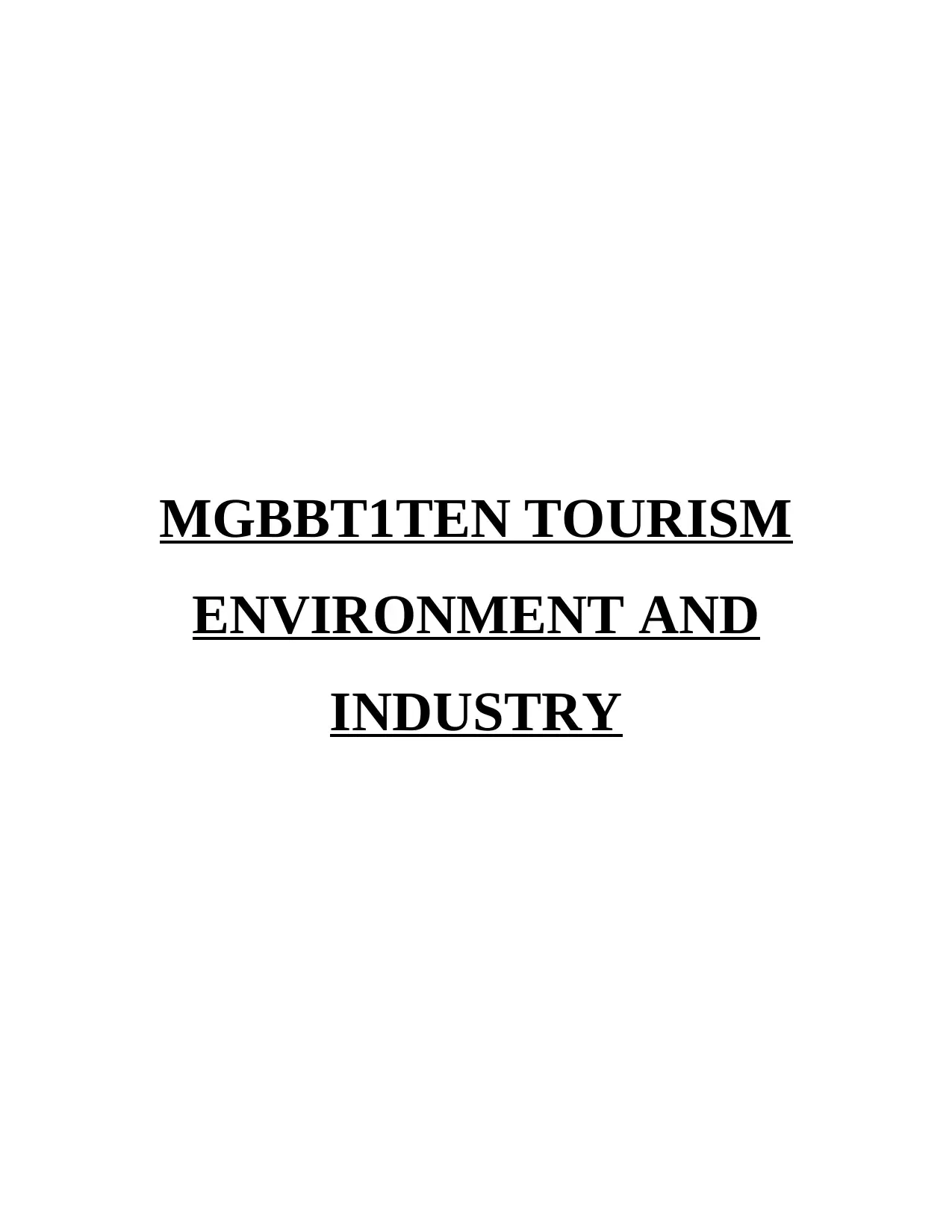
MGBBT1TEN TOURISM
ENVIRONMENT AND
INDUSTRY
ENVIRONMENT AND
INDUSTRY
Paraphrase This Document
Need a fresh take? Get an instant paraphrase of this document with our AI Paraphraser
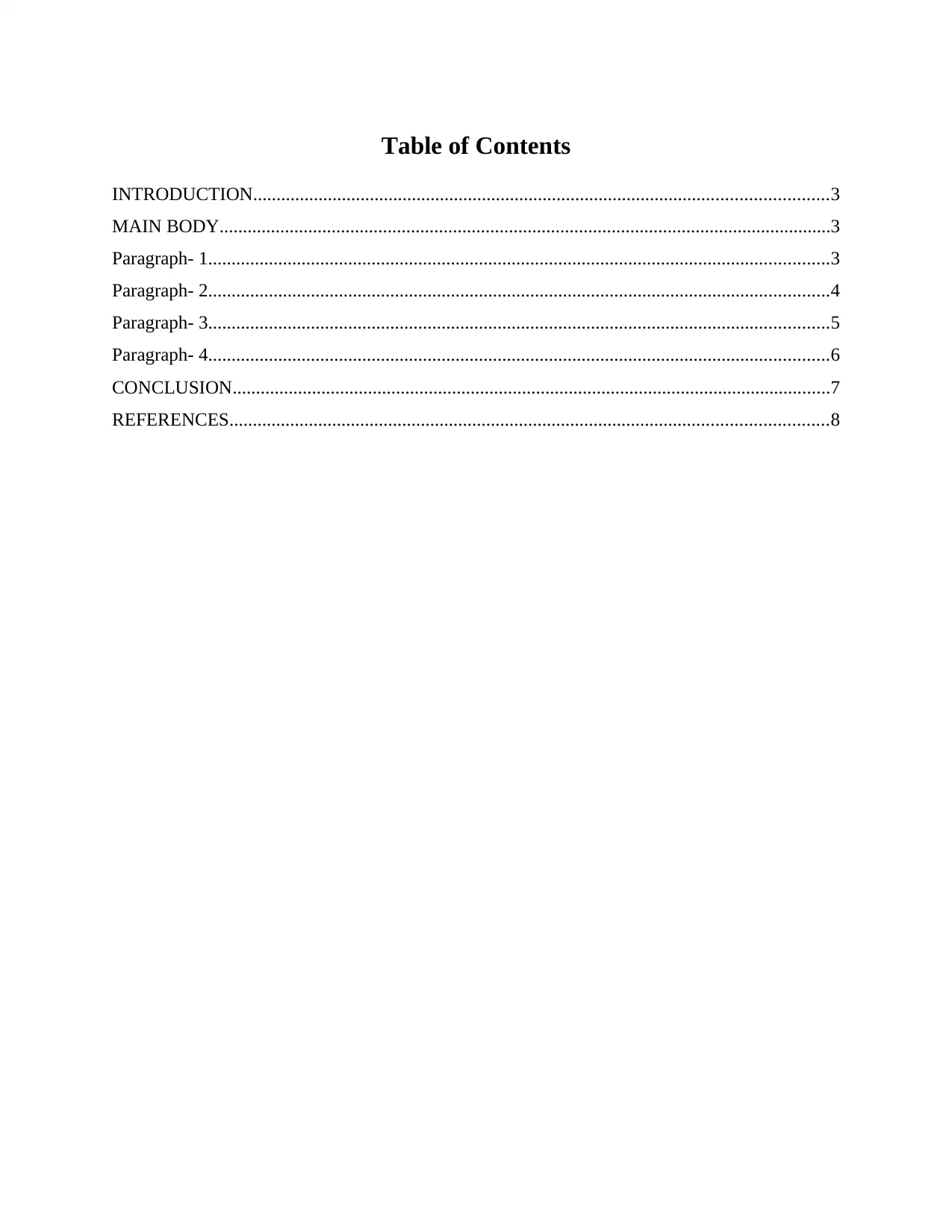
Table of Contents
INTRODUCTION...........................................................................................................................3
MAIN BODY...................................................................................................................................3
Paragraph- 1.....................................................................................................................................3
Paragraph- 2.....................................................................................................................................4
Paragraph- 3.....................................................................................................................................5
Paragraph- 4.....................................................................................................................................6
CONCLUSION................................................................................................................................7
REFERENCES................................................................................................................................8
INTRODUCTION...........................................................................................................................3
MAIN BODY...................................................................................................................................3
Paragraph- 1.....................................................................................................................................3
Paragraph- 2.....................................................................................................................................4
Paragraph- 3.....................................................................................................................................5
Paragraph- 4.....................................................................................................................................6
CONCLUSION................................................................................................................................7
REFERENCES................................................................................................................................8
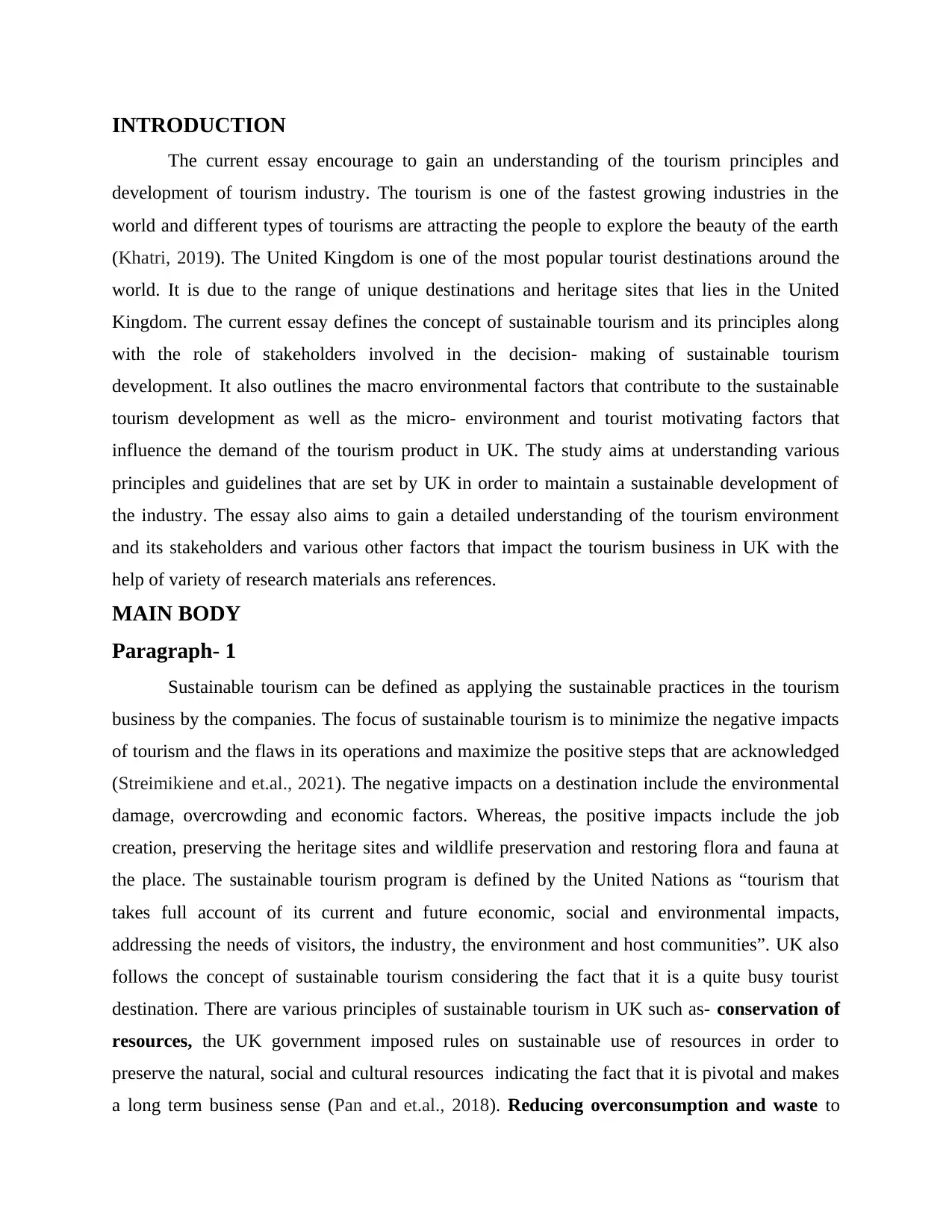
INTRODUCTION
The current essay encourage to gain an understanding of the tourism principles and
development of tourism industry. The tourism is one of the fastest growing industries in the
world and different types of tourisms are attracting the people to explore the beauty of the earth
(Khatri, 2019). The United Kingdom is one of the most popular tourist destinations around the
world. It is due to the range of unique destinations and heritage sites that lies in the United
Kingdom. The current essay defines the concept of sustainable tourism and its principles along
with the role of stakeholders involved in the decision- making of sustainable tourism
development. It also outlines the macro environmental factors that contribute to the sustainable
tourism development as well as the micro- environment and tourist motivating factors that
influence the demand of the tourism product in UK. The study aims at understanding various
principles and guidelines that are set by UK in order to maintain a sustainable development of
the industry. The essay also aims to gain a detailed understanding of the tourism environment
and its stakeholders and various other factors that impact the tourism business in UK with the
help of variety of research materials ans references.
MAIN BODY
Paragraph- 1
Sustainable tourism can be defined as applying the sustainable practices in the tourism
business by the companies. The focus of sustainable tourism is to minimize the negative impacts
of tourism and the flaws in its operations and maximize the positive steps that are acknowledged
(Streimikiene and et.al., 2021). The negative impacts on a destination include the environmental
damage, overcrowding and economic factors. Whereas, the positive impacts include the job
creation, preserving the heritage sites and wildlife preservation and restoring flora and fauna at
the place. The sustainable tourism program is defined by the United Nations as “tourism that
takes full account of its current and future economic, social and environmental impacts,
addressing the needs of visitors, the industry, the environment and host communities”. UK also
follows the concept of sustainable tourism considering the fact that it is a quite busy tourist
destination. There are various principles of sustainable tourism in UK such as- conservation of
resources, the UK government imposed rules on sustainable use of resources in order to
preserve the natural, social and cultural resources indicating the fact that it is pivotal and makes
a long term business sense (Pan and et.al., 2018). Reducing overconsumption and waste to
The current essay encourage to gain an understanding of the tourism principles and
development of tourism industry. The tourism is one of the fastest growing industries in the
world and different types of tourisms are attracting the people to explore the beauty of the earth
(Khatri, 2019). The United Kingdom is one of the most popular tourist destinations around the
world. It is due to the range of unique destinations and heritage sites that lies in the United
Kingdom. The current essay defines the concept of sustainable tourism and its principles along
with the role of stakeholders involved in the decision- making of sustainable tourism
development. It also outlines the macro environmental factors that contribute to the sustainable
tourism development as well as the micro- environment and tourist motivating factors that
influence the demand of the tourism product in UK. The study aims at understanding various
principles and guidelines that are set by UK in order to maintain a sustainable development of
the industry. The essay also aims to gain a detailed understanding of the tourism environment
and its stakeholders and various other factors that impact the tourism business in UK with the
help of variety of research materials ans references.
MAIN BODY
Paragraph- 1
Sustainable tourism can be defined as applying the sustainable practices in the tourism
business by the companies. The focus of sustainable tourism is to minimize the negative impacts
of tourism and the flaws in its operations and maximize the positive steps that are acknowledged
(Streimikiene and et.al., 2021). The negative impacts on a destination include the environmental
damage, overcrowding and economic factors. Whereas, the positive impacts include the job
creation, preserving the heritage sites and wildlife preservation and restoring flora and fauna at
the place. The sustainable tourism program is defined by the United Nations as “tourism that
takes full account of its current and future economic, social and environmental impacts,
addressing the needs of visitors, the industry, the environment and host communities”. UK also
follows the concept of sustainable tourism considering the fact that it is a quite busy tourist
destination. There are various principles of sustainable tourism in UK such as- conservation of
resources, the UK government imposed rules on sustainable use of resources in order to
preserve the natural, social and cultural resources indicating the fact that it is pivotal and makes
a long term business sense (Pan and et.al., 2018). Reducing overconsumption and waste to
⊘ This is a preview!⊘
Do you want full access?
Subscribe today to unlock all pages.

Trusted by 1+ million students worldwide
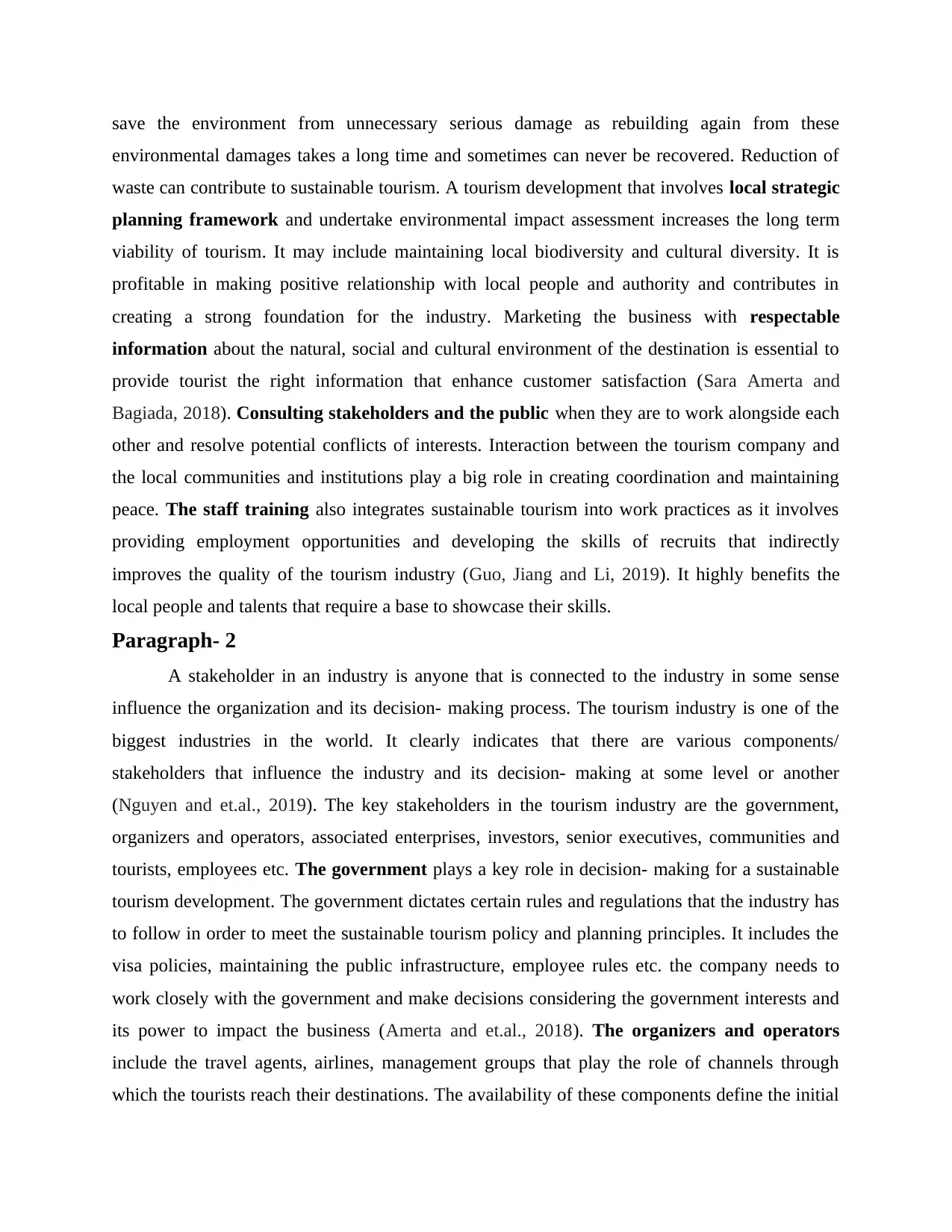
save the environment from unnecessary serious damage as rebuilding again from these
environmental damages takes a long time and sometimes can never be recovered. Reduction of
waste can contribute to sustainable tourism. A tourism development that involves local strategic
planning framework and undertake environmental impact assessment increases the long term
viability of tourism. It may include maintaining local biodiversity and cultural diversity. It is
profitable in making positive relationship with local people and authority and contributes in
creating a strong foundation for the industry. Marketing the business with respectable
information about the natural, social and cultural environment of the destination is essential to
provide tourist the right information that enhance customer satisfaction (Sara Amerta and
Bagiada, 2018). Consulting stakeholders and the public when they are to work alongside each
other and resolve potential conflicts of interests. Interaction between the tourism company and
the local communities and institutions play a big role in creating coordination and maintaining
peace. The staff training also integrates sustainable tourism into work practices as it involves
providing employment opportunities and developing the skills of recruits that indirectly
improves the quality of the tourism industry (Guo, Jiang and Li, 2019). It highly benefits the
local people and talents that require a base to showcase their skills.
Paragraph- 2
A stakeholder in an industry is anyone that is connected to the industry in some sense
influence the organization and its decision- making process. The tourism industry is one of the
biggest industries in the world. It clearly indicates that there are various components/
stakeholders that influence the industry and its decision- making at some level or another
(Nguyen and et.al., 2019). The key stakeholders in the tourism industry are the government,
organizers and operators, associated enterprises, investors, senior executives, communities and
tourists, employees etc. The government plays a key role in decision- making for a sustainable
tourism development. The government dictates certain rules and regulations that the industry has
to follow in order to meet the sustainable tourism policy and planning principles. It includes the
visa policies, maintaining the public infrastructure, employee rules etc. the company needs to
work closely with the government and make decisions considering the government interests and
its power to impact the business (Amerta and et.al., 2018). The organizers and operators
include the travel agents, airlines, management groups that play the role of channels through
which the tourists reach their destinations. The availability of these components define the initial
environmental damages takes a long time and sometimes can never be recovered. Reduction of
waste can contribute to sustainable tourism. A tourism development that involves local strategic
planning framework and undertake environmental impact assessment increases the long term
viability of tourism. It may include maintaining local biodiversity and cultural diversity. It is
profitable in making positive relationship with local people and authority and contributes in
creating a strong foundation for the industry. Marketing the business with respectable
information about the natural, social and cultural environment of the destination is essential to
provide tourist the right information that enhance customer satisfaction (Sara Amerta and
Bagiada, 2018). Consulting stakeholders and the public when they are to work alongside each
other and resolve potential conflicts of interests. Interaction between the tourism company and
the local communities and institutions play a big role in creating coordination and maintaining
peace. The staff training also integrates sustainable tourism into work practices as it involves
providing employment opportunities and developing the skills of recruits that indirectly
improves the quality of the tourism industry (Guo, Jiang and Li, 2019). It highly benefits the
local people and talents that require a base to showcase their skills.
Paragraph- 2
A stakeholder in an industry is anyone that is connected to the industry in some sense
influence the organization and its decision- making process. The tourism industry is one of the
biggest industries in the world. It clearly indicates that there are various components/
stakeholders that influence the industry and its decision- making at some level or another
(Nguyen and et.al., 2019). The key stakeholders in the tourism industry are the government,
organizers and operators, associated enterprises, investors, senior executives, communities and
tourists, employees etc. The government plays a key role in decision- making for a sustainable
tourism development. The government dictates certain rules and regulations that the industry has
to follow in order to meet the sustainable tourism policy and planning principles. It includes the
visa policies, maintaining the public infrastructure, employee rules etc. the company needs to
work closely with the government and make decisions considering the government interests and
its power to impact the business (Amerta and et.al., 2018). The organizers and operators
include the travel agents, airlines, management groups that play the role of channels through
which the tourists reach their destinations. The availability of these components define the initial
Paraphrase This Document
Need a fresh take? Get an instant paraphrase of this document with our AI Paraphraser
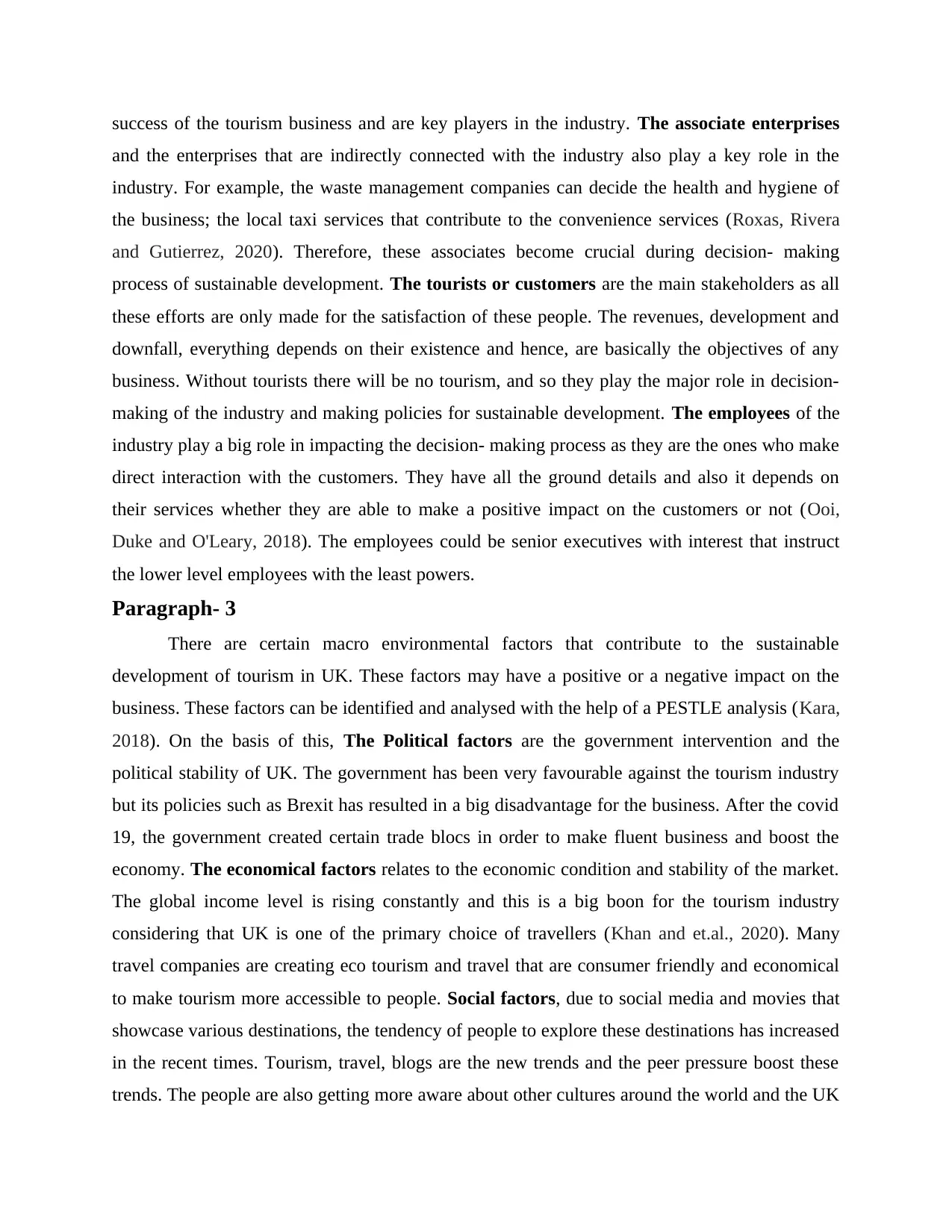
success of the tourism business and are key players in the industry. The associate enterprises
and the enterprises that are indirectly connected with the industry also play a key role in the
industry. For example, the waste management companies can decide the health and hygiene of
the business; the local taxi services that contribute to the convenience services (Roxas, Rivera
and Gutierrez, 2020). Therefore, these associates become crucial during decision- making
process of sustainable development. The tourists or customers are the main stakeholders as all
these efforts are only made for the satisfaction of these people. The revenues, development and
downfall, everything depends on their existence and hence, are basically the objectives of any
business. Without tourists there will be no tourism, and so they play the major role in decision-
making of the industry and making policies for sustainable development. The employees of the
industry play a big role in impacting the decision- making process as they are the ones who make
direct interaction with the customers. They have all the ground details and also it depends on
their services whether they are able to make a positive impact on the customers or not (Ooi,
Duke and O'Leary, 2018). The employees could be senior executives with interest that instruct
the lower level employees with the least powers.
Paragraph- 3
There are certain macro environmental factors that contribute to the sustainable
development of tourism in UK. These factors may have a positive or a negative impact on the
business. These factors can be identified and analysed with the help of a PESTLE analysis (Kara,
2018). On the basis of this, The Political factors are the government intervention and the
political stability of UK. The government has been very favourable against the tourism industry
but its policies such as Brexit has resulted in a big disadvantage for the business. After the covid
19, the government created certain trade blocs in order to make fluent business and boost the
economy. The economical factors relates to the economic condition and stability of the market.
The global income level is rising constantly and this is a big boon for the tourism industry
considering that UK is one of the primary choice of travellers (Khan and et.al., 2020). Many
travel companies are creating eco tourism and travel that are consumer friendly and economical
to make tourism more accessible to people. Social factors, due to social media and movies that
showcase various destinations, the tendency of people to explore these destinations has increased
in the recent times. Tourism, travel, blogs are the new trends and the peer pressure boost these
trends. The people are also getting more aware about other cultures around the world and the UK
and the enterprises that are indirectly connected with the industry also play a key role in the
industry. For example, the waste management companies can decide the health and hygiene of
the business; the local taxi services that contribute to the convenience services (Roxas, Rivera
and Gutierrez, 2020). Therefore, these associates become crucial during decision- making
process of sustainable development. The tourists or customers are the main stakeholders as all
these efforts are only made for the satisfaction of these people. The revenues, development and
downfall, everything depends on their existence and hence, are basically the objectives of any
business. Without tourists there will be no tourism, and so they play the major role in decision-
making of the industry and making policies for sustainable development. The employees of the
industry play a big role in impacting the decision- making process as they are the ones who make
direct interaction with the customers. They have all the ground details and also it depends on
their services whether they are able to make a positive impact on the customers or not (Ooi,
Duke and O'Leary, 2018). The employees could be senior executives with interest that instruct
the lower level employees with the least powers.
Paragraph- 3
There are certain macro environmental factors that contribute to the sustainable
development of tourism in UK. These factors may have a positive or a negative impact on the
business. These factors can be identified and analysed with the help of a PESTLE analysis (Kara,
2018). On the basis of this, The Political factors are the government intervention and the
political stability of UK. The government has been very favourable against the tourism industry
but its policies such as Brexit has resulted in a big disadvantage for the business. After the covid
19, the government created certain trade blocs in order to make fluent business and boost the
economy. The economical factors relates to the economic condition and stability of the market.
The global income level is rising constantly and this is a big boon for the tourism industry
considering that UK is one of the primary choice of travellers (Khan and et.al., 2020). Many
travel companies are creating eco tourism and travel that are consumer friendly and economical
to make tourism more accessible to people. Social factors, due to social media and movies that
showcase various destinations, the tendency of people to explore these destinations has increased
in the recent times. Tourism, travel, blogs are the new trends and the peer pressure boost these
trends. The people are also getting more aware about other cultures around the world and the UK
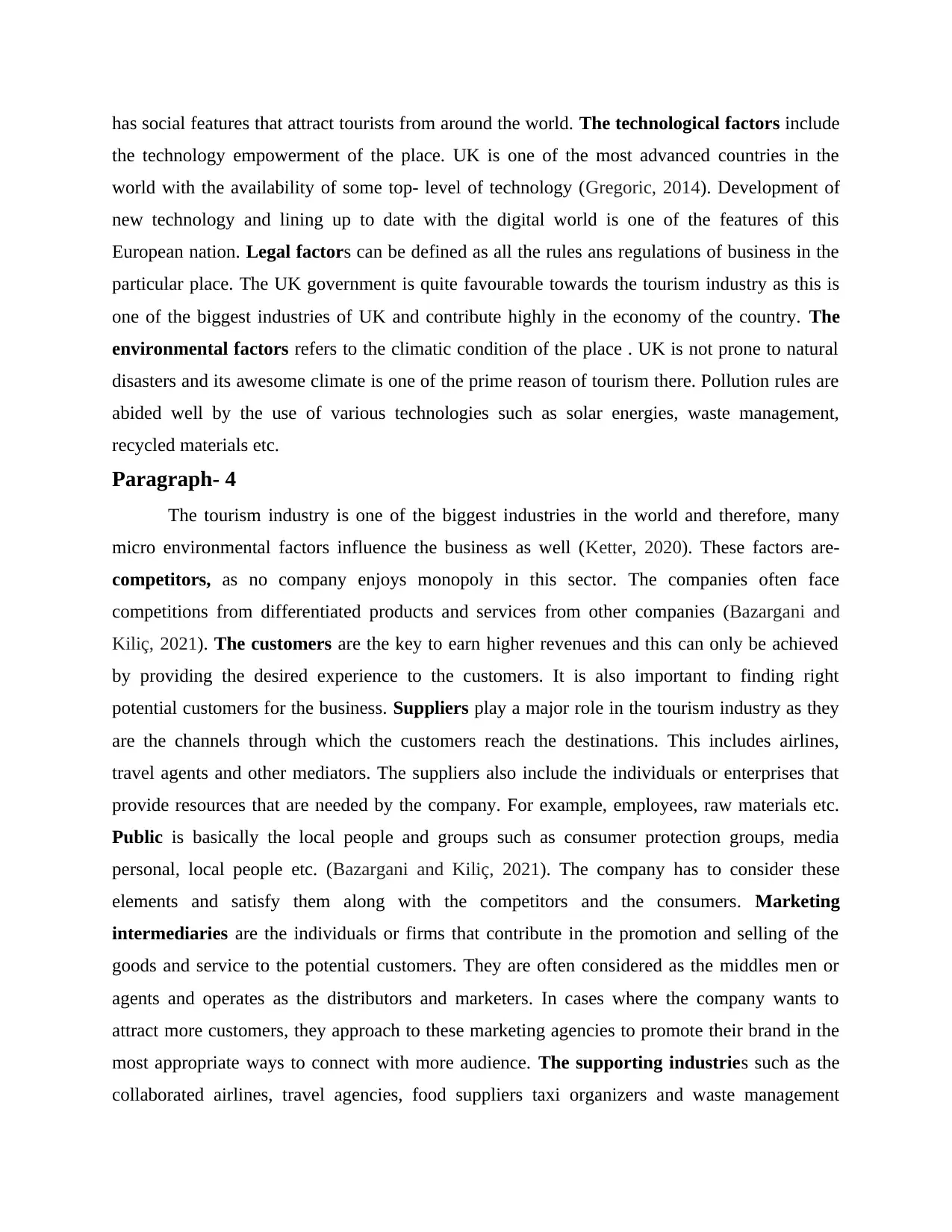
has social features that attract tourists from around the world. The technological factors include
the technology empowerment of the place. UK is one of the most advanced countries in the
world with the availability of some top- level of technology (Gregoric, 2014). Development of
new technology and lining up to date with the digital world is one of the features of this
European nation. Legal factors can be defined as all the rules ans regulations of business in the
particular place. The UK government is quite favourable towards the tourism industry as this is
one of the biggest industries of UK and contribute highly in the economy of the country. The
environmental factors refers to the climatic condition of the place . UK is not prone to natural
disasters and its awesome climate is one of the prime reason of tourism there. Pollution rules are
abided well by the use of various technologies such as solar energies, waste management,
recycled materials etc.
Paragraph- 4
The tourism industry is one of the biggest industries in the world and therefore, many
micro environmental factors influence the business as well (Ketter, 2020). These factors are-
competitors, as no company enjoys monopoly in this sector. The companies often face
competitions from differentiated products and services from other companies (Bazargani and
Kiliç, 2021). The customers are the key to earn higher revenues and this can only be achieved
by providing the desired experience to the customers. It is also important to finding right
potential customers for the business. Suppliers play a major role in the tourism industry as they
are the channels through which the customers reach the destinations. This includes airlines,
travel agents and other mediators. The suppliers also include the individuals or enterprises that
provide resources that are needed by the company. For example, employees, raw materials etc.
Public is basically the local people and groups such as consumer protection groups, media
personal, local people etc. (Bazargani and Kiliç, 2021). The company has to consider these
elements and satisfy them along with the competitors and the consumers. Marketing
intermediaries are the individuals or firms that contribute in the promotion and selling of the
goods and service to the potential customers. They are often considered as the middles men or
agents and operates as the distributors and marketers. In cases where the company wants to
attract more customers, they approach to these marketing agencies to promote their brand in the
most appropriate ways to connect with more audience. The supporting industries such as the
collaborated airlines, travel agencies, food suppliers taxi organizers and waste management
the technology empowerment of the place. UK is one of the most advanced countries in the
world with the availability of some top- level of technology (Gregoric, 2014). Development of
new technology and lining up to date with the digital world is one of the features of this
European nation. Legal factors can be defined as all the rules ans regulations of business in the
particular place. The UK government is quite favourable towards the tourism industry as this is
one of the biggest industries of UK and contribute highly in the economy of the country. The
environmental factors refers to the climatic condition of the place . UK is not prone to natural
disasters and its awesome climate is one of the prime reason of tourism there. Pollution rules are
abided well by the use of various technologies such as solar energies, waste management,
recycled materials etc.
Paragraph- 4
The tourism industry is one of the biggest industries in the world and therefore, many
micro environmental factors influence the business as well (Ketter, 2020). These factors are-
competitors, as no company enjoys monopoly in this sector. The companies often face
competitions from differentiated products and services from other companies (Bazargani and
Kiliç, 2021). The customers are the key to earn higher revenues and this can only be achieved
by providing the desired experience to the customers. It is also important to finding right
potential customers for the business. Suppliers play a major role in the tourism industry as they
are the channels through which the customers reach the destinations. This includes airlines,
travel agents and other mediators. The suppliers also include the individuals or enterprises that
provide resources that are needed by the company. For example, employees, raw materials etc.
Public is basically the local people and groups such as consumer protection groups, media
personal, local people etc. (Bazargani and Kiliç, 2021). The company has to consider these
elements and satisfy them along with the competitors and the consumers. Marketing
intermediaries are the individuals or firms that contribute in the promotion and selling of the
goods and service to the potential customers. They are often considered as the middles men or
agents and operates as the distributors and marketers. In cases where the company wants to
attract more customers, they approach to these marketing agencies to promote their brand in the
most appropriate ways to connect with more audience. The supporting industries such as the
collaborated airlines, travel agencies, food suppliers taxi organizers and waste management
⊘ This is a preview!⊘
Do you want full access?
Subscribe today to unlock all pages.

Trusted by 1+ million students worldwide
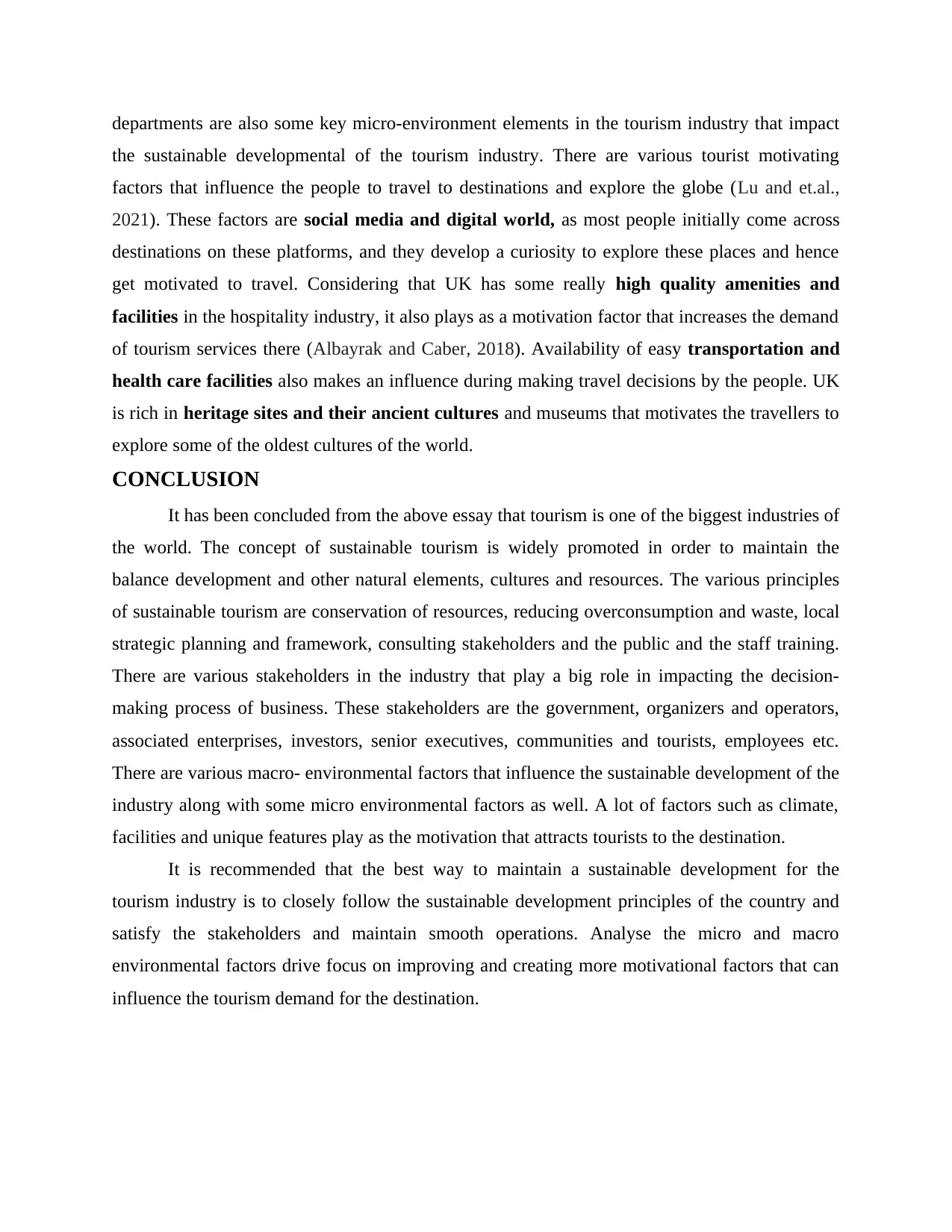
departments are also some key micro-environment elements in the tourism industry that impact
the sustainable developmental of the tourism industry. There are various tourist motivating
factors that influence the people to travel to destinations and explore the globe (Lu and et.al.,
2021). These factors are social media and digital world, as most people initially come across
destinations on these platforms, and they develop a curiosity to explore these places and hence
get motivated to travel. Considering that UK has some really high quality amenities and
facilities in the hospitality industry, it also plays as a motivation factor that increases the demand
of tourism services there (Albayrak and Caber, 2018). Availability of easy transportation and
health care facilities also makes an influence during making travel decisions by the people. UK
is rich in heritage sites and their ancient cultures and museums that motivates the travellers to
explore some of the oldest cultures of the world.
CONCLUSION
It has been concluded from the above essay that tourism is one of the biggest industries of
the world. The concept of sustainable tourism is widely promoted in order to maintain the
balance development and other natural elements, cultures and resources. The various principles
of sustainable tourism are conservation of resources, reducing overconsumption and waste, local
strategic planning and framework, consulting stakeholders and the public and the staff training.
There are various stakeholders in the industry that play a big role in impacting the decision-
making process of business. These stakeholders are the government, organizers and operators,
associated enterprises, investors, senior executives, communities and tourists, employees etc.
There are various macro- environmental factors that influence the sustainable development of the
industry along with some micro environmental factors as well. A lot of factors such as climate,
facilities and unique features play as the motivation that attracts tourists to the destination.
It is recommended that the best way to maintain a sustainable development for the
tourism industry is to closely follow the sustainable development principles of the country and
satisfy the stakeholders and maintain smooth operations. Analyse the micro and macro
environmental factors drive focus on improving and creating more motivational factors that can
influence the tourism demand for the destination.
the sustainable developmental of the tourism industry. There are various tourist motivating
factors that influence the people to travel to destinations and explore the globe (Lu and et.al.,
2021). These factors are social media and digital world, as most people initially come across
destinations on these platforms, and they develop a curiosity to explore these places and hence
get motivated to travel. Considering that UK has some really high quality amenities and
facilities in the hospitality industry, it also plays as a motivation factor that increases the demand
of tourism services there (Albayrak and Caber, 2018). Availability of easy transportation and
health care facilities also makes an influence during making travel decisions by the people. UK
is rich in heritage sites and their ancient cultures and museums that motivates the travellers to
explore some of the oldest cultures of the world.
CONCLUSION
It has been concluded from the above essay that tourism is one of the biggest industries of
the world. The concept of sustainable tourism is widely promoted in order to maintain the
balance development and other natural elements, cultures and resources. The various principles
of sustainable tourism are conservation of resources, reducing overconsumption and waste, local
strategic planning and framework, consulting stakeholders and the public and the staff training.
There are various stakeholders in the industry that play a big role in impacting the decision-
making process of business. These stakeholders are the government, organizers and operators,
associated enterprises, investors, senior executives, communities and tourists, employees etc.
There are various macro- environmental factors that influence the sustainable development of the
industry along with some micro environmental factors as well. A lot of factors such as climate,
facilities and unique features play as the motivation that attracts tourists to the destination.
It is recommended that the best way to maintain a sustainable development for the
tourism industry is to closely follow the sustainable development principles of the country and
satisfy the stakeholders and maintain smooth operations. Analyse the micro and macro
environmental factors drive focus on improving and creating more motivational factors that can
influence the tourism demand for the destination.
Paraphrase This Document
Need a fresh take? Get an instant paraphrase of this document with our AI Paraphraser
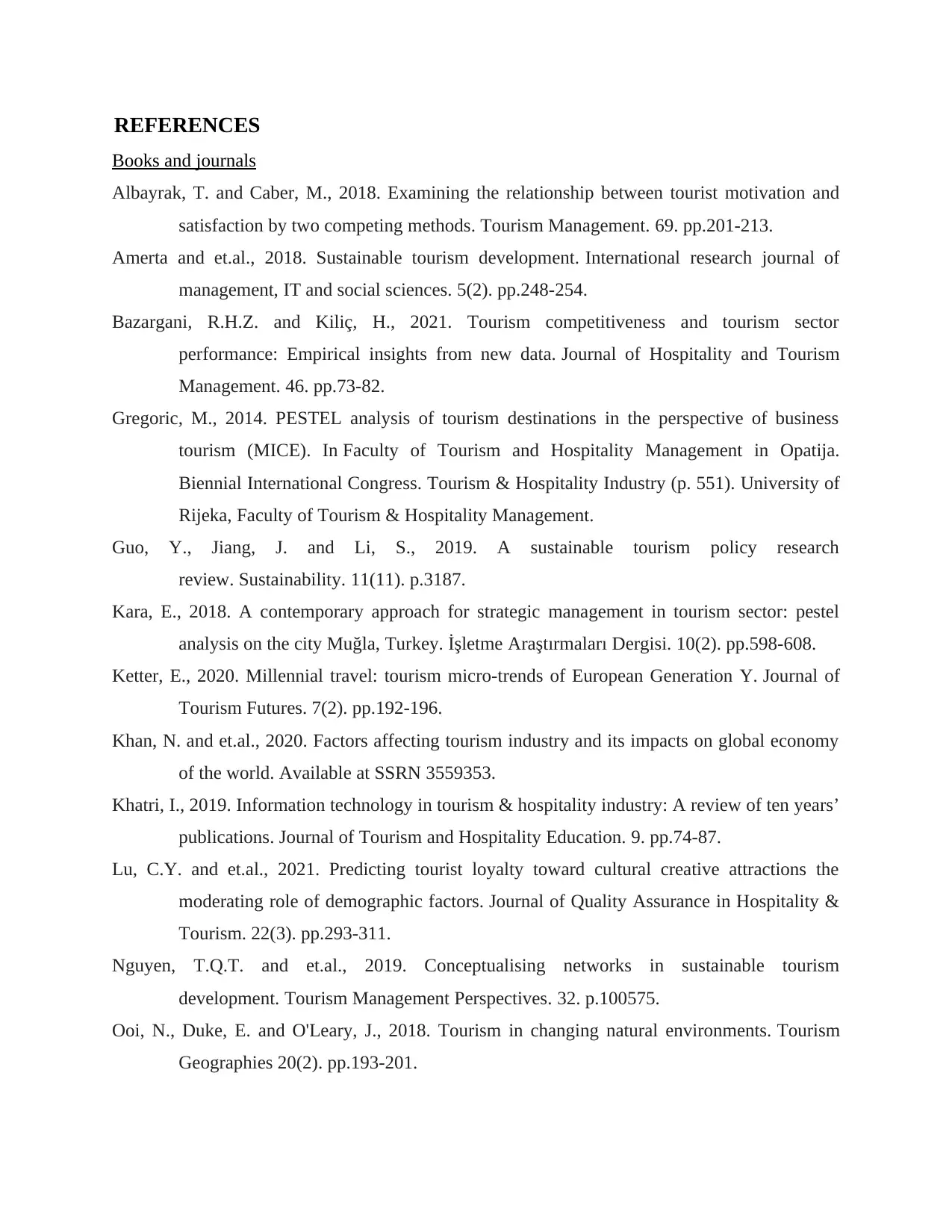
REFERENCES
Books and journals
Albayrak, T. and Caber, M., 2018. Examining the relationship between tourist motivation and
satisfaction by two competing methods. Tourism Management. 69. pp.201-213.
Amerta and et.al., 2018. Sustainable tourism development. International research journal of
management, IT and social sciences. 5(2). pp.248-254.
Bazargani, R.H.Z. and Kiliç, H., 2021. Tourism competitiveness and tourism sector
performance: Empirical insights from new data. Journal of Hospitality and Tourism
Management. 46. pp.73-82.
Gregoric, M., 2014. PESTEL analysis of tourism destinations in the perspective of business
tourism (MICE). In Faculty of Tourism and Hospitality Management in Opatija.
Biennial International Congress. Tourism & Hospitality Industry (p. 551). University of
Rijeka, Faculty of Tourism & Hospitality Management.
Guo, Y., Jiang, J. and Li, S., 2019. A sustainable tourism policy research
review. Sustainability. 11(11). p.3187.
Kara, E., 2018. A contemporary approach for strategic management in tourism sector: pestel
analysis on the city Muğla, Turkey. İşletme Araştırmaları Dergisi. 10(2). pp.598-608.
Ketter, E., 2020. Millennial travel: tourism micro-trends of European Generation Y. Journal of
Tourism Futures. 7(2). pp.192-196.
Khan, N. and et.al., 2020. Factors affecting tourism industry and its impacts on global economy
of the world. Available at SSRN 3559353.
Khatri, I., 2019. Information technology in tourism & hospitality industry: A review of ten years’
publications. Journal of Tourism and Hospitality Education. 9. pp.74-87.
Lu, C.Y. and et.al., 2021. Predicting tourist loyalty toward cultural creative attractions the
moderating role of demographic factors. Journal of Quality Assurance in Hospitality &
Tourism. 22(3). pp.293-311.
Nguyen, T.Q.T. and et.al., 2019. Conceptualising networks in sustainable tourism
development. Tourism Management Perspectives. 32. p.100575.
Ooi, N., Duke, E. and O'Leary, J., 2018. Tourism in changing natural environments. Tourism
Geographies 20(2). pp.193-201.
Books and journals
Albayrak, T. and Caber, M., 2018. Examining the relationship between tourist motivation and
satisfaction by two competing methods. Tourism Management. 69. pp.201-213.
Amerta and et.al., 2018. Sustainable tourism development. International research journal of
management, IT and social sciences. 5(2). pp.248-254.
Bazargani, R.H.Z. and Kiliç, H., 2021. Tourism competitiveness and tourism sector
performance: Empirical insights from new data. Journal of Hospitality and Tourism
Management. 46. pp.73-82.
Gregoric, M., 2014. PESTEL analysis of tourism destinations in the perspective of business
tourism (MICE). In Faculty of Tourism and Hospitality Management in Opatija.
Biennial International Congress. Tourism & Hospitality Industry (p. 551). University of
Rijeka, Faculty of Tourism & Hospitality Management.
Guo, Y., Jiang, J. and Li, S., 2019. A sustainable tourism policy research
review. Sustainability. 11(11). p.3187.
Kara, E., 2018. A contemporary approach for strategic management in tourism sector: pestel
analysis on the city Muğla, Turkey. İşletme Araştırmaları Dergisi. 10(2). pp.598-608.
Ketter, E., 2020. Millennial travel: tourism micro-trends of European Generation Y. Journal of
Tourism Futures. 7(2). pp.192-196.
Khan, N. and et.al., 2020. Factors affecting tourism industry and its impacts on global economy
of the world. Available at SSRN 3559353.
Khatri, I., 2019. Information technology in tourism & hospitality industry: A review of ten years’
publications. Journal of Tourism and Hospitality Education. 9. pp.74-87.
Lu, C.Y. and et.al., 2021. Predicting tourist loyalty toward cultural creative attractions the
moderating role of demographic factors. Journal of Quality Assurance in Hospitality &
Tourism. 22(3). pp.293-311.
Nguyen, T.Q.T. and et.al., 2019. Conceptualising networks in sustainable tourism
development. Tourism Management Perspectives. 32. p.100575.
Ooi, N., Duke, E. and O'Leary, J., 2018. Tourism in changing natural environments. Tourism
Geographies 20(2). pp.193-201.
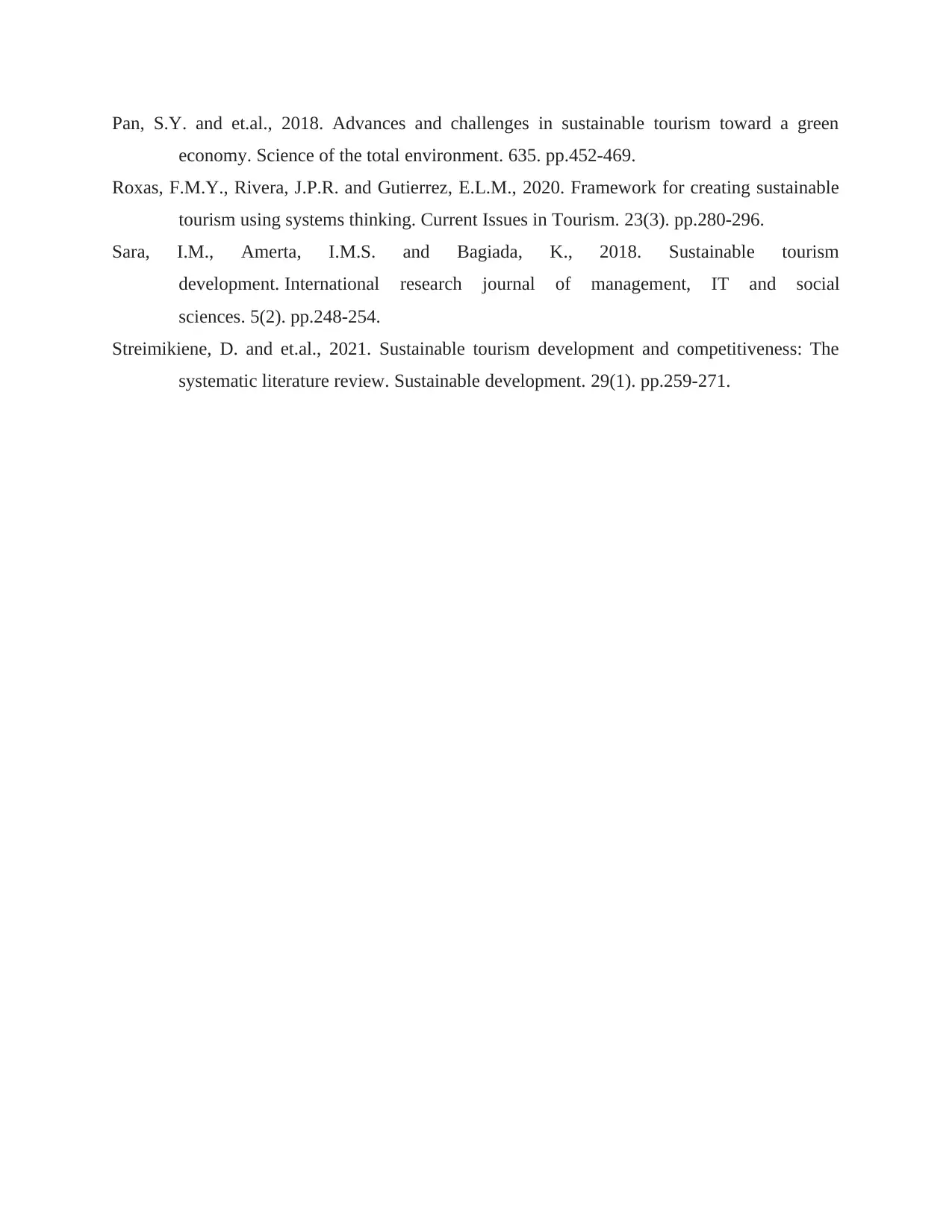
Pan, S.Y. and et.al., 2018. Advances and challenges in sustainable tourism toward a green
economy. Science of the total environment. 635. pp.452-469.
Roxas, F.M.Y., Rivera, J.P.R. and Gutierrez, E.L.M., 2020. Framework for creating sustainable
tourism using systems thinking. Current Issues in Tourism. 23(3). pp.280-296.
Sara, I.M., Amerta, I.M.S. and Bagiada, K., 2018. Sustainable tourism
development. International research journal of management, IT and social
sciences. 5(2). pp.248-254.
Streimikiene, D. and et.al., 2021. Sustainable tourism development and competitiveness: The
systematic literature review. Sustainable development. 29(1). pp.259-271.
economy. Science of the total environment. 635. pp.452-469.
Roxas, F.M.Y., Rivera, J.P.R. and Gutierrez, E.L.M., 2020. Framework for creating sustainable
tourism using systems thinking. Current Issues in Tourism. 23(3). pp.280-296.
Sara, I.M., Amerta, I.M.S. and Bagiada, K., 2018. Sustainable tourism
development. International research journal of management, IT and social
sciences. 5(2). pp.248-254.
Streimikiene, D. and et.al., 2021. Sustainable tourism development and competitiveness: The
systematic literature review. Sustainable development. 29(1). pp.259-271.
⊘ This is a preview!⊘
Do you want full access?
Subscribe today to unlock all pages.

Trusted by 1+ million students worldwide

10
1 out of 10
Related Documents
Your All-in-One AI-Powered Toolkit for Academic Success.
+13062052269
info@desklib.com
Available 24*7 on WhatsApp / Email
![[object Object]](/_next/static/media/star-bottom.7253800d.svg)
Unlock your academic potential
Copyright © 2020–2026 A2Z Services. All Rights Reserved. Developed and managed by ZUCOL.
